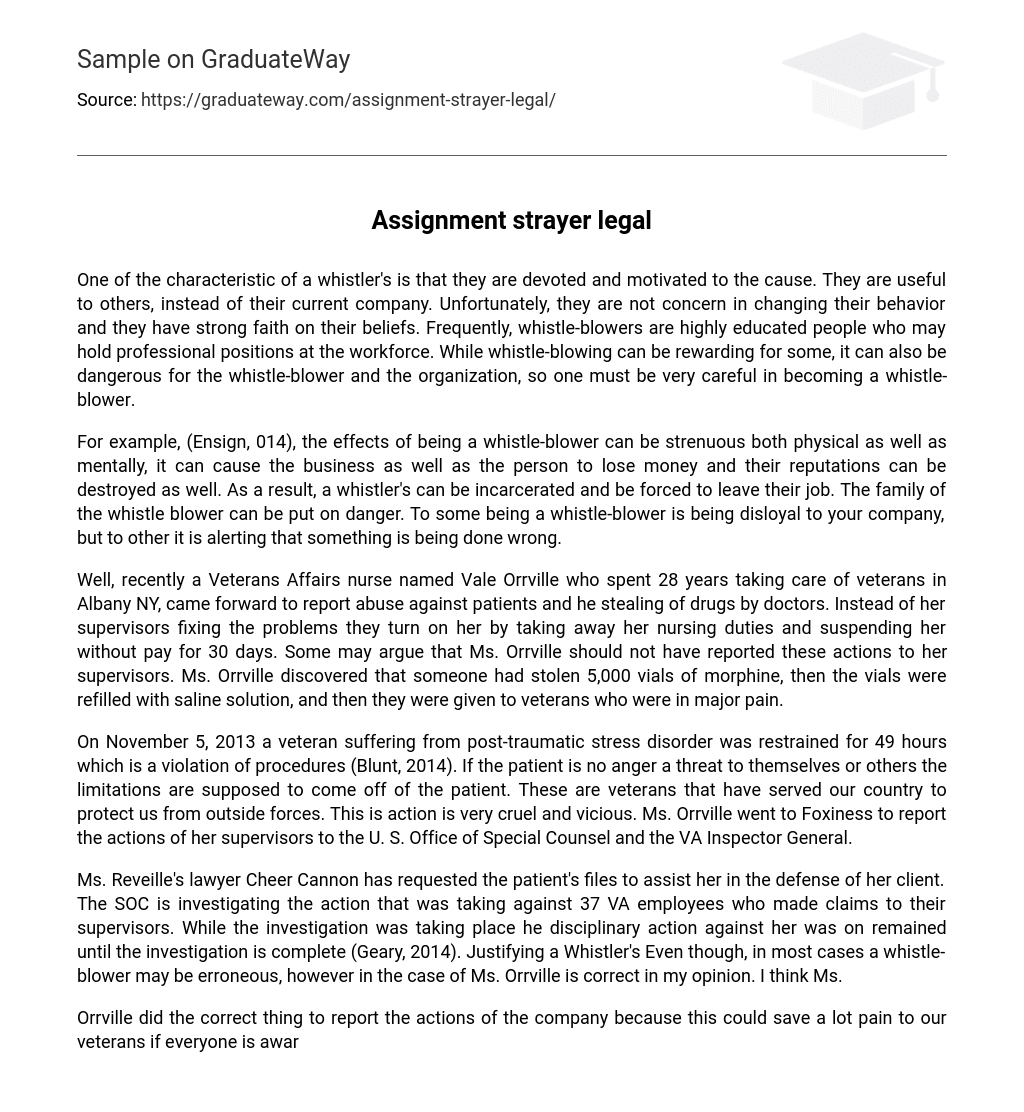One of the characteristic of a whistler’s is that they are devoted and motivated to the cause. They are useful to others, instead of their current company. Unfortunately, they are not concern in changing their behavior and they have strong faith on their beliefs. Frequently, whistle-blowers are highly educated people who may hold professional positions at the workforce. While whistle-blowing can be rewarding for some, it can also be dangerous for the whistle-blower and the organization, so one must be very careful in becoming a whistle-blower.
For example, (Ensign, 014), the effects of being a whistle-blower can be strenuous both physical as well as mentally, it can cause the business as well as the person to lose money and their reputations can be destroyed as well. As a result, a whistler’s can be incarcerated and be forced to leave their job. The family of the whistle blower can be put on danger. To some being a whistle-blower is being disloyal to your company, but to other it is alerting that something is being done wrong.
Well, recently a Veterans Affairs nurse named Vale Orrville who spent 28 years taking care of veterans in Albany NY, came forward to report abuse against patients and he stealing of drugs by doctors. Instead of her supervisors fixing the problems they turn on her by taking away her nursing duties and suspending her without pay for 30 days. Some may argue that Ms. Orrville should not have reported these actions to her supervisors. Ms. Orrville discovered that someone had stolen 5,000 vials of morphine, then the vials were refilled with saline solution, and then they were given to veterans who were in major pain.
On November 5, 2013 a veteran suffering from post-traumatic stress disorder was restrained for 49 hours which is a violation of procedures (Blunt, 2014). If the patient is no anger a threat to themselves or others the limitations are supposed to come off of the patient. These are veterans that have served our country to protect us from outside forces. This is action is very cruel and vicious. Ms. Orrville went to Foxiness to report the actions of her supervisors to the U. S. Office of Special Counsel and the VA Inspector General.
Ms. Reveille’s lawyer Cheer Cannon has requested the patient’s files to assist her in the defense of her client. The SOC is investigating the action that was taking against 37 VA employees who made claims to their supervisors. While the investigation was taking place he disciplinary action against her was on remained until the investigation is complete (Geary, 2014). Justifying a Whistler’s Even though, in most cases a whistle-blower may be erroneous, however in the case of Ms. Orrville is correct in my opinion. I think Ms.
Orrville did the correct thing to report the actions of the company because this could save a lot pain to our veterans if everyone is aware of it. This situation is unfortunate for the company but the public can benefit it. It is a very difficult situation to justify because a person with morals cannot just walk away from unlawful situation. Even though, Ms. Orrville is the whistle-blower, she had a good cause and noble motive to help others. So, what does this mean for Ms. Orrville and her getting her job back and the retaliation of the job?
Whistler’s under the Serbians- Solely Act According to the 2002 Serbians-Solely Act court ruling of 6-3, weightlessness have protection against public companies, private contractors and subcontractors (Sooth, 2014). Employees who reported that their company retaliated against them for reporting alleged misconduct can possibly bring legal claims against their employer. Think this a very difficult discussion for the courts to justify. Each scenario may vary biased on how the whistle-blower is distributing the classified information.





